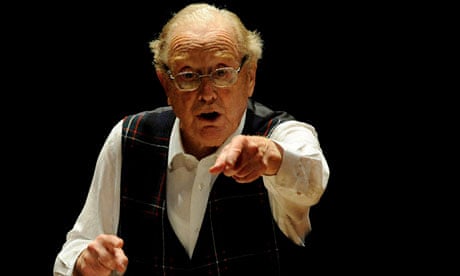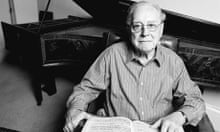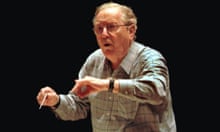Sir Charles Mackerras, who has died aged 84 of cancer, was one of the most versatile, adventurous and generally admired and respected conductors of the past six decades. He boxed the compass of repertory and musical experience in a manner equalled by few, if any, of his contemporaries.
He would be as eager to argue with a friend or colleague on authenticity in performing Handel as in discussing the relative merits of the operas of Janacek. Throughout his career he promoted the latter – from the early 1950s, when they were almost unknown, until they were being performed regularly throughout the opera world, almost entirely due to his pioneering efforts.
At the same time, he was a scholarly Mozartian who kept up with the latest research in the field of performing his operas, a sure advocate of French opera, a strong, no-nonsense interpreter of the Viennese classics, an expert in early 19th-century operas by Donizetti and others, and an abiding admirer of Gilbert and Sullivan – his arrangement in 1951 of some of Sullivan's music in the ballet Pineapple Poll for what was then the Sadler's Wells Ballet, later the Royal Ballet, first brought him to general attention. In all these spheres, and in many others, he was as much an ardent enthusiast as a musical expert.
No detail of a score escaped his eagle eye. No mistake, perpetrated over the years, was allowed to pass. Everything had to be freshly conceived and thought through from his own viewpoint. That sometimes made him an overweening colleague, but his strong views necessitated absolute devotion from those required to carry out his stringent demands. He wanted to be assured that all concerned in a venture were giving their all, as he assuredly was.
Though born in Schenectady, in New York state, Mackerras was brought up in Sydney, Australia, and went to Sydney grammar school. At the city's New South Wales Conservatory, he studied the oboe, piano and composition, and his first job was as principal oboist with the Sydney Symphony Orchestra; in 1973 he returned to conduct it in the opening concert in the new Sydney Opera House, with the soprano Birgit Nilsson as soloist. After emigrating to Britain in 1947, he received a British Council scholarship to study with the eminent Czech conductor Václav Talich in Prague, where he conceived his love for Czech music – and in particular, Janacek.
He had access to the composer's original scores and began to realise that later editions and changes were not in line with Janacek's wishes. Accordingly, he had the idea of attempting to perform his operas as originally intended, a project that was to bear such significant fruit in later years.
In 1948 he was engaged by Sadler's Wells Opera as a staff conductor, making his debut with Die Fledermaus, and came to prominence in 1951, conducting the first British stage performance of Janacek's Katya Kabanova. From 1956 he was one of the main conductors of the English Opera Group, set up to perform Benjamin Britten's scores, but eventually an injudicious remark meant he joined the ranks of Britten "corpses", those who had offended the Aldeburgh master in one way or another, although he remained a lifelong advocate of the composer's operas. He was also principal conductor of the BBC Concert Orchestra from 1954 to 1956.
His debut at Covent Garden in 1963 came – typically – with another pioneering performance: Shostakovich's Katerina Ismailova. Although he was passed over a couple of times for the post of music director, he was a welcome visitor for the rest of his life, and it was there that he demonstrated his affinity with Verdi and Puccini.
In 1965 he conducted a landmark staging of The Marriage of Figaro at Sadler's Wells in which he attempted to perform the work as it might have been done in Mozart's time. This was in advance of the period-instrument revolution, and caused quite a stir. Although some of the decorations to arias went rather far, as Mackerras himself later admitted, his example was soon to be followed far and wide.
Mackerras then became chief conductor of the Hamburg State Opera (1966-69). Rehearsal time was often minimal, so his gift for conducting in an almost extempore fashion came to the fore. He rather enjoyed such a challenge, and often repeated the experience at the Bavarian and Vienna State Operas.
In 1970 he was back in London as music director of Sadler's Wells Opera, now at the London Coliseum and from 1974 renamed English National Opera, where Lord Harewood, a close friend, was managing director. Mackerras stayed in the post until 1977, exercised a firm control on the style and content of productions and was instrumental in broadening the repertory. He worked closely with the resident ensemble but also collaborated with stars such as Janet Baker in memorable stagings of Handel's Julius Caesar, Massenet's Werther and Donizetti's Mary Stuart, all of them happily preserved on disc.
From 1977 to 1979 he was principal guest conductor of the BBC Symphony Orchestra. After a period as a freelance, when he began a distinguished career conducting at the Metropolitan in New York, Mackerras moved to the Welsh National Opera as music director in 1987, remaining there until 1992. In 1989 he presented a Lucia di Lammermoor based on a facsimile of the autograph score, a version he conducted again at the Metropolitan in 2000.
Besides work at the San Francisco Opera, where he was principal guest conductor from 1990, he made his Glyndebourne debut with Falstaff that year, and in November 1991 conducted Don Giovanni at the Tyl theatre in Prague, where it was first given in 1787.
He was increasingly admired in Prague and became principal guest conductor of the Czech Philharmonic (1997-2003). He conducted the orchestra at the Edinburgh festival in 2000, and that year they made a recording in Prague of Janacek's rarely heard first opera, Sarka. Their 1998 recording of Dvorak's Rusalka won many awards.
Another of his close connections was with the Scottish Chamber Orchestra (SCO) with which, in the 1990s, he recorded the Mozart operas with librettos by Lorenzo da Ponte – Figaro, Don Giovanni and Così Fan Tutte. It also gave him an ideal forum for exploring Brahms's orchestral music with fewer strings than have come to be usual.
Mackerras was happy to take a historically informed perspective with both conventional orchestras, such as the SCO, and period-instrument ensembles, notably the Orchestra of the Age of Enlightenment. The respect in which mainstream symphony orchestras held him was evidenced by his appointment as principal guest conductor of the Philharmonia Orchestra in 2002, and the success of his first concert, when he was already 78, with the Berlin Philharmonic, in Mozart, Dvorak and Janacek, in 2004, when this famous band responded with alert enthusiasm. Members of the audience wondered why the orchestra had taken so long to bring him to Berlin. He also returned frequently to Prague and Brno, Janacek's home town.
All Mackerras's interpretations were remarkable for their rhythmic energy. On the podium he was eagle-eyed, intent on every detail, but seldom at the expense of the longer view. In the orchestral repertory, he was a stickler for authentic performance, based on autograph sources, nowhere more so than in Schubert's "Great" C major Symphony, of which he made two groundbreaking recordings. But his readings were also imbued with his love for the lyrical in music, and the soaring, highly individual sound of the scores of Janacek took flight under his baton, nowhere more so than in the Glagolithic Mass.
However, there was no pinning him down to one type of music or interpretation. He brought classical beauty to his Gluck, dramatic power to his Verdi and Wagner, fine sentiment allied to conviction in his Gounod, Massenet and Bizet – Carmen was a special favourite of his which he conducted in many houses – and expansive lyricism to Mahler, as his recording of the Fifth Symphony evinces.
In the opera house, Mackerras became disaffected with the deconstructionist stagings of modern directors, and after one famous conflict in Munich in the early 1990s, he insisted on seeing designs and consulting a director before undertaking any production – as was the case when he returned to the ENO with Handel's Alcina in 1999. He strongly believed that any staging had to bear some likeness to the intentions of composer and librettist. Similarly, where operatic scores were concerned, he tried to fathom what the composer wanted rather than imposing his views.
In discussing another favourite of his, Richard Strauss's Der Rosenkavalier, he scorned the current penchant for slow, sentimental readings. He believed the work to be basically a comedy, which should move at the brisk pace Strauss intended.
Mackerras has left a large discography, and the fact that he was never signed up on a permanent contract by any major company proved something of a blessing. Instead, he was called up by many companies for particular projects after his own heart, from his seminal recording in the 1950s of Handel's Music for the Royal Fireworks with the huge complement of wind instruments first heard by George III – which had to be recorded in the middle of the night so that all the players would be available – to his classic Mozart and Janacek. His complete set of the Beethoven symphonies was much praised, as, of course, were his recordings of the Gilbert and Sullivan classics.
In many ways Mackerras was a man of his age, a man for all seasons of music who lived for his art and for the bettering of its execution. Although he had his specialities, he was game for anything that he could enthuse over, and that enthusiasm was conveyed almost every time he was on the podium or in the pit.
Public and private friends warmed to his down-to-earth, no-nonsense personality and his ready sense of humour. He was not one of those maestros who live in some Olympian world, divorced from the real one. Mackerras liked to mix with real people, sharing his ideas with those around him.
He achieved all he did by his amazing energy and a tireless quest for perfection. He was really unhappy if he was not working on some project or another, reluctant to turn down any offer of work and – given his wide interests – he was inevitably in demand in most musical centres. He and his wife, Judy, whom he married in 1947, had one escape, their isolated home on the Italian island of Elba, where they were excellent hosts.
Mackerras was knighted in 1979 and appointed a Companion of Honour in 2003. He is survived by Judy and their daughter Catherine. Their daughter Fiona died in 2006.
Barry Millington writes: Mackerras might have been made for the role of spry octogenarian: he certainly inhabited it with all the zestful vitality that characterised his entire career. Despite his illness, his live music-making continued at a hectic pace. When he took over a revival of Figaro at Covent Garden in 2008, his extremely brisk tempi, in places almost relentless, suggested that he was determined to deny himself any Grand Old Man status. Returning to Covent Garden earlier this year, he conducted Janacek's Cunning Little Vixen – surprisingly, for the first time there. Bill Bryden's 20-year-old production was injected with new life by Mackerras, who brought warmth, affection and authority to the score.
His long association with ENO was marked in October 2009 when he returned to conduct Britten's The Turn of the Screw. After the performance, notable for its harmonisation of luminous beauty and dark undercurrents, a presentation was made by the music director, Edward Gardner, highlighting not only his long association with the company but also that with the work – he had first conducted it in 1954, when it came to London shortly after the Venice premiere.
Nor was there any flagging in his recording work. His two-disc set of Mozart's last four symphonies (2008), interpretations of intelligence, clarity and wit, but above all irrepressible energy, won several awards. A follow-up, featuring the Paris, Haffner and Linz symphonies, appeared last April. In the same month Supraphon released his new recording of Dvorak tone poems, for which Mackerras had particularly high regard, while the Philharmonia put out the same composer's Seventh and Eighth Symphonies on its own label.
Recent honours included the Royal Philharmonic Society's gold medal in 2005 and the Queen's medal for music, of which he was the first recipient. In 2008 he was made honorary president of the Edinburgh International Festival Society. The performances of Mozart's Idomeneo he had been due to conduct at the festival this summer had been keenly anticipated.
Alan Charles MacLaurin Mackerras, conductor, born 17 November 1925; died 14 July 2010
Alan Blyth died in 2007




